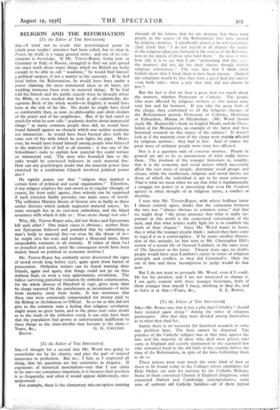[To the Editor of THE SPECTATOR] thought- for a. second
that Mr. Wood was going to overwhelm me by his charity; and play the part of injured innocence to perfection. But no ; I fear, as I suspected all along, that his questions are but certainties in disguise. If exponents of historical materialism—not that I can claim to be one—are sometimes. impatient, it is because their position is so frequently, and often it would appear deliberately, mis- understood.. • For example, there is the elementary misconception running through all _his letters, that we are denying that there were people in the course of the Reformation who were moved by religious motives. I specifically stated, if he will remember, (July 22nd) that " I do not myself at all dispute the reality of the religious ideas put forward in the course of the Reforma- tion in the minds of those who held them." In view of thlt, how silly it is to say that I am " pretending that the; (i.e., the martyrs) did not die for their sincere though foolish religious convictions." The very fact that I think them foolish shows that I think them to have been sincere. (Indeed my complaint would be that they were a good deal too sincere —on both sides : what a pity that they did not choose to live !) But the fact is that we hear a great deal too much about the martyrs, whether Protestant or Catholic. The people who were affected by religious motives to this extent were very few and far between. If you take the great bulk of the clergy, they conformed to all the religious changes of the Reformation period, Protestant or Catholic, Henrician or EdWardian, Marian or. Elizabethan. (Mr. Wood should study Mr. Baskerville's book on English Monks and the Disso- lution of the MOnasteries, an example of the latest and best historical research on this aspect of the subject.) It doesn't look as if the majority even of the clergy were mainIF.affected by religious motives : they. had to live. And of course the great mass. of ordinary people were even less affected.
Nor is it a question only of conscious motives. People in general are apt to be so unconscious of what really moves them. The pOsition of the* younger historians is, roughly, that it is the economic and social factors which necessarily affect the vast mass of people, determine social groups and classes, while the intellectual, religious and moral factors are those of which the individual is apt to be most conscious. That is what we mean when we say that what is fundamentally a struggle for power (it is interesting that even Dr. Coulton agrees) is often thought of in religious terms, a conflict of doctrine.
I note that Mr. Trevor-Roper, with whose brilliant letter I almost entirely agree, thinks that the connexion between the two was " always obvious to common sense," and that we might drop " the pious pretence that what is really im- portant in this world is the conjectural constitution of the next, and that what armies really fight for is to establish the truth of their slogans." Since Mr. Wood wants to know, this is what the younger people think ; indeed they have come to regard it as a commonplace. If he wants another illustra- tion of this attitude, let him turn to Mr. Christopher Hill's review of a recent life of General Lambert, in the same issue of The Spectator as his letter. Twenty years ago, no doubt, people would have seen Lambert's career in terms of religious principle and conflict, as they did Cromwell's. Only the out of date and those incompetent to judge would do that now.
But I do not want to persuade Mr. Wood, even if I could. He has . his position, and I am not interested to change it. I am quite content with these younger historians, both of them younger than myself I fancy, thinking as they do, and
to leave it at that.—Yours, &c., A. L. RowsE.






































 Previous page
Previous page